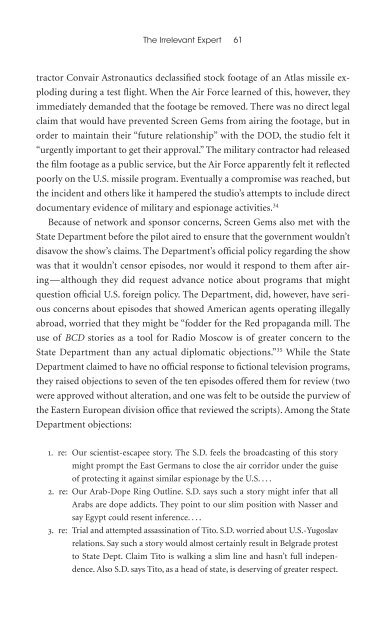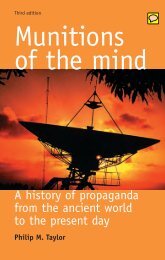- Page 2:
Citizen Spy
- Page 6:
Citizen Spy Television, Espionage,
- Page 10:
For Darlene, who taught me to read
- Page 14:
Contents Preface: Doing Television
- Page 20:
x Preface doesn’t offer easily is
- Page 24:
xii Preface matter of what historic
- Page 28:
This page intentionally left blank
- Page 32:
xvi Acknowledgments of my dissertat
- Page 36:
Esquire magazine, May 1966. xviii I
- Page 40:
xx Introduction Political and cultu
- Page 44:
xxii Introduction Wild Wild West (C
- Page 48:
xxiv Introduction first target was
- Page 52: xxvi Introduction a thing scarcely
- Page 56: xxviii Introduction suddenly become
- Page 60: xxx Introduction textual practices,
- Page 64: xxxii Introduction subjects. Where
- Page 68: xxxiv Introduction outsiders who ar
- Page 72: xxxvi Introduction Chapter 3 examin
- Page 76: xxxviii Introduction episode carefu
- Page 80: This page intentionally left blank
- Page 84: 2 Documentary Melodrama and World R
- Page 88: 4 Documentary Melodrama These progr
- Page 92: 6 Documentary Melodrama Spy Culture
- Page 96: 8 Documentary Melodrama than they d
- Page 100: 10 Documentary Melodrama to moderni
- Page 106: Documentary Melodrama 13 would refl
- Page 110: Documentary Melodrama 15 Ziv produc
- Page 114: Documentary Melodrama 17 nationalis
- Page 118: Documentary Melodrama 19 there. In
- Page 122: Documentary Melodrama 21 kee, Cinci
- Page 126: Documentary Melodrama 23 here at ho
- Page 130: Documentary Melodrama 25 national.
- Page 134: I Led 3 Lives and the Agent of Hist
- Page 138: I Led 3 Lives and the Agent of Hist
- Page 142: I Led 3 Lives and the Agent of Hist
- Page 146: I Led 3 Lives and the Agent of Hist
- Page 150: I Led 3 Lives and the Agent of Hist
- Page 154:
I Led 3 Lives and the Agent of Hist
- Page 158:
I Led 3 Lives and the Agent of Hist
- Page 162:
I Led 3 Lives and the Agent of Hist
- Page 166:
I Led 3 Lives and the Agent of Hist
- Page 170:
I Led 3 Lives and the Agent of Hist
- Page 174:
I Led 3 Lives and the Agent of Hist
- Page 178:
3 The Irrelevant Expert and the Inc
- Page 182:
The Irrelevant Expert 51 By the lat
- Page 186:
The Irrelevant Expert 53 “On this
- Page 190:
The Irrelevant Expert 55 role of
- Page 194:
The Irrelevant Expert 57 will be th
- Page 198:
The Irrelevant Expert 59 debate scr
- Page 202:
The Irrelevant Expert 61 tractor Co
- Page 206:
The Irrelevant Expert 63 would be p
- Page 210:
The Irrelevant Expert 65 The show
- Page 214:
The Irrelevant Expert 67 bee that e
- Page 218:
The Irrelevant Expert 69 watches Me
- Page 222:
The Irrelevant Expert 71 ington fra
- Page 226:
4 Parody and the Limits of Agency T
- Page 230:
Parody and the Limits of Agency 75
- Page 234:
Parody and the Limits of Agency 77
- Page 238:
Parody and the Limits of Agency 79
- Page 242:
Parody and the Limits of Agency 81
- Page 246:
Parody and the Limits of Agency 83
- Page 250:
Parody and the Limits of Agency 85
- Page 254:
Parody and the Limits of Agency 87
- Page 258:
Parody and the Limits of Agency 89
- Page 262:
Parody and the Limits of Agency 91
- Page 266:
Parody and the Limits of Agency 93
- Page 270:
Parody and the Limits of Agency 95
- Page 274:
Parody and the Limits of Agency 97
- Page 278:
Parody and the Limits of Agency 99
- Page 282:
Agent 86 takes an important call. P
- Page 286:
Parody and the Limits of Agency 103
- Page 290:
Parody and the Limits of Agency 105
- Page 294:
Parody and the Limits of Agency 107
- Page 298:
Parody and the Limits of Agency 109
- Page 302:
Parody and the Limits of Agency 111
- Page 306:
5 I Spy a Colorblind Nation African
- Page 310:
I Spy a Colorblind Nation 115 be th
- Page 314:
I Spy a Colorblind Nation 117 activ
- Page 318:
I Spy a Colorblind Nation 119 both
- Page 322:
I Spy a Colorblind Nation 121 compe
- Page 326:
I Spy a Colorblind Nation 123 threa
- Page 330:
I Spy a Colorblind Nation 125 door
- Page 334:
I Spy a Colorblind Nation 127 mob t
- Page 338:
I Spy a Colorblind Nation 129 to ac
- Page 342:
I Spy a Colorblind Nation 131 the s
- Page 346:
I Spy a Colorblind Nation 133 the e
- Page 350:
I Spy a Colorblind Nation 135 nent
- Page 354:
I Spy a Colorblind Nation 137 Ali q
- Page 358:
I Spy a Colorblind Nation 139 that
- Page 362:
I Spy a Colorblind Nation 141 belon
- Page 366:
I Spy a Colorblind Nation 143 Ameri
- Page 370:
Agents or Technocrats 145 espionage
- Page 374:
Agents or Technocrats 147 rights su
- Page 378:
Agents or Technocrats 149 Mission:
- Page 382:
Agents or Technocrats 151 Steven Hi
- Page 386:
Agents or Technocrats 153 chairman
- Page 390:
Agents or Technocrats 155 The U.S.
- Page 394:
Agents or Technocrats 157 Despite s
- Page 398:
Agents or Technocrats 159 politics
- Page 402:
Agents or Technocrats 161 Only occa
- Page 406:
Agents or Technocrats 163 claws, ea
- Page 410:
Agents or Technocrats 165 readily c
- Page 416:
168 Agents or Technocrats which the
- Page 420:
170 Agents or Technocrats brought i
- Page 424:
172 Agents or Technocrats three sea
- Page 428:
174 Agents or Technocrats televisio
- Page 432:
The most succinct expression of the
- Page 436:
178 Conclusion The Prisoner extends
- Page 440:
180 Conclusion In the fall of 2001,
- Page 444:
182 Conclusion Teri Bauer, said of
- Page 448:
184 Conclusion I was there in Ameri
- Page 452:
186 Conclusion eventual globalizati
- Page 456:
188 Conclusion endorse Cosby’s ch
- Page 460:
190 Conclusion unraveling in the la
- Page 464:
192 Notes to Introduction Gilligan,
- Page 468:
194 Notes to Introduction The Ameri
- Page 472:
196 Notes to Chapter 1 contradictor
- Page 476:
198 Notes to Chapter 1 implement th
- Page 480:
200 Notes to Chapter 2 54. Jon Epst
- Page 484:
202 Notes to Chapter 3 due, as Dohe
- Page 488:
204 Notes to Chapter 3 19. Moore, M
- Page 492:
206 Notes to Chapter 4 48. Ibid. 49
- Page 496:
208 Notes to Chapter 4 26. Vaughn s
- Page 500:
210 Notes to Chapter 5 64. Ibid., 1
- Page 504:
212 Notes to Chapter 5 15. “The R
- Page 508:
214 Notes to Chapter 5 Cable to Hen
- Page 512:
216 Notes to Chapter 6 12. Curtin,
- Page 516:
218 Notes to Conclusion A Cultural
- Page 520:
This page intentionally left blank
- Page 524:
Authority, xxxvi, 28, 47, 82; civic
- Page 528:
Combat, 105 Communism, 10, 19, 20,
- Page 532:
Feldon, Barbara, 102-3, 111 Felicit
- Page 536:
International markets, 156, 157 Int
- Page 540:
Mod Squad, The, 110, 210n10, 211n3
- Page 544:
Pop movement, 88, 89, 90, 96, 103 P
- Page 548:
Summer of the Negro, 120 Suspense,
- Page 552:
Michael Kackman is assistant profes



